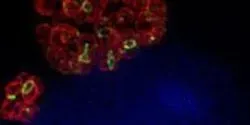Biological Sciences

The team of Johannes Zuber at the Institute of Molecular Pathology (IMP) in Vienna, Austria, managed to overcome remaining key limitations of RNA interference (RNAi) - a unique method to specifically shut off genes. By using an optimized design, the scientists were able to inhibit genes with greatly enhanced efficiency and accuracy. The new method facilitates the search for drug targets and improves the interpretation of experimental results. The IMP will make this „RNAi toolkit“ available to researchers. Results of the study are published in the current issue of Cell Reports.

Through lotions, shampoos and other personal care products (PCPs), infants and toddlers are likely becoming exposed to potentially harmful substances, called parabens, at an even higher level than adult women in the U.S., researchers have reported. They published their findings on parabens, which have been linked to reproductive and other health issues, in the American Chemical Society journal Environmental Science & Technology.

A team of University of Arizona researchers is looking at ways to grow strawberries hydroponically in a greenhouse.

Top Researchers to Present Integrated Approaches to Disease Research, Drug Development.

Philip Schwartz, PhD, supervisor and senior scientist and director of the National Human Neural Stem Cell Resource at the Children’s Hospital of Orange County Research Institute, talks to Contributing Editor Tanuja Koppal, PhD, about the subtle particulars and expertise needed to design and maintain a laboratory dedicated to culturing stem cells.















